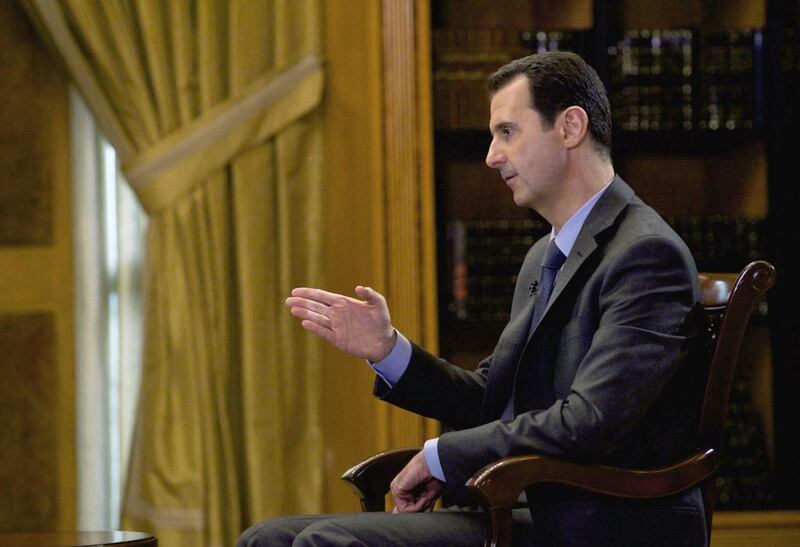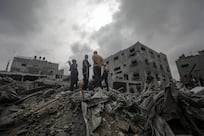The awful truth about American policy towards the war in Syria – the most dangerous, destabilising and tragic conflict in the world – was summed up last week by the astounding revelation that there are only nine American-trained rebels currently fighting in Syria.
Last week in these pages, I noted that Russia is getting a free pass in much of the Arab world for sponsoring and enabling Bashar Al Assad, who is primarily responsible for the hundreds of thousands of dead, and millions of displaced, Syrian civilians, and the destruction of much of the country. Russia’s criminal culpability as the primary handmaiden of the destruction of Syria even outstrips Iran’s far more widely recognised malfeasance.
America’s Syria policy, exemplified by the single-digit numbers of US-trained fighters on the ground, is in no sense a comparable tragedy. But it is certainly a farce.
The paltry amount of $500 million was allocated by the US congress for the training. fifty four rebels were selected, with nine now reportedly fighting in Syria under the terms of the programme. Forget about The Six Million Dollar Man of 1970s TV fame, each of these fighters cost more than $55 million.
It’s not just embarrassing, worse than useless, and a gigantic waste of money. It’s incontrovertible evidence of a policy in desperate free fall.
From the outset, American inaction has ensured that the wrong-headed idea that there is no one to work with on the ground in Syria has increasingly become a self-fulfilling prophecy. It’s still not too late to build such a force, but it grows ever more difficult to achieve, particularly given the depth of this recent failure.
Obama administration policy, which emphasises the need to avoid the collapse of governance institutions in Syria, such as they are, militates against any confrontation with the Assad regime. Never mind that it is formal US policy that he has lost all legitimacy and must go.
Perhaps a sham programme that pretends to be training people to influence events on the ground while actually attempting no such thing is the perfect embodiment of a policy that purports to oppose the continuation of a government when it actually does not wish to see it go, at least just yet. If Mr Al Assad were the only issue, this tragicomedy might actually be comprehensible.
But the United States has a stated policy of seeking to “degrade and ultimately defeat” ISIL. American and international attention to the menace of ISIL was captured when the organisation rampaged through Iraq in 2014. Washington clearly has an “Iraq-first” policy when it comes to ISIL.
But ISIL’s base and headquarters are in Syria. It cannot be defeated in Iraq alone, and the “Iraq-first” approach all but guarantees it will survive as a potent force. ISIL might even be driven out of most of Iraq, but spread into new areas from its Syrian base. Indeed, ISIL’s regional influence is expanding, while the effort to drive it out of Iraq is making a little headway.
Obviously ISIL has to be confronted in Syria, even if the real goal is some form of containment. Air power alone will do little to “degrade”, let alone “defeat”, these fanatics. Ground forces are indisputably essential. And all honest observers admit any use of forces perceived to be supporting the Assad regime will only strengthen ISIL’s hand and drive more Syrian Sunnis into their camp.
These incontrovertible facts led to the training programme that has just been exposed as a combination of cynical fraud and embarrassing fiasco.
Sadly this is all a continuation of the approach that led to the shameful backtracking over Barack Obama’s chemical weapons “red line” in 2013. After repeated instances of chemical attacks on civilians by the regime, instead of being punished, Mr Al Assad was actually rewarded with an agreement in which he promised to relinquish and destroy all of his chemical weapons.
He suddenly emerged as a partner with the United States in the accord, with all the diplomatic legitimacy that implies, and the agreement clearly required him to keep control of all the areas of the country necessary to implement it.
Now there is considerable evidence Mr Al Assad has been again using chlorine bombs. Washington’s mighty response? Quietly suggesting a UN inquiry.
Russia has defended its policies in Syria as open and honest. Indeed, Moscow makes no pretence of doing anything other than funding and supporting its Syrian client’s mass murder and mass displacement, though it preposterously rationalises it as counterterrorism.
The United States, by contrast, has no meaningful policy in Syria. Any doubts about that, even after the chemical weapons travesty, have surely been dispelled by this parody of a training programme.
American apathy has continuously made matters worse and limited Washington’s own options. But it’s never too late. History doesn’t stop and events continue to unfold. People will always respond to carrots and sticks.
The trouble is that a coherent policy requires a desired outcome, and the United States doesn’t seem to know what, within the realm of the possible, it wants to see happen in Syria. This inexplicable and inexcusable confusion is the proximate cause of America’s Syria policy crisis. Washington, and the world, cannot afford any more of this self-defeating dithering.
Hussein Ibish is a senior resident scholar at the Arab Gulf States Institute in Washington
On Twitter: @ibishblog





